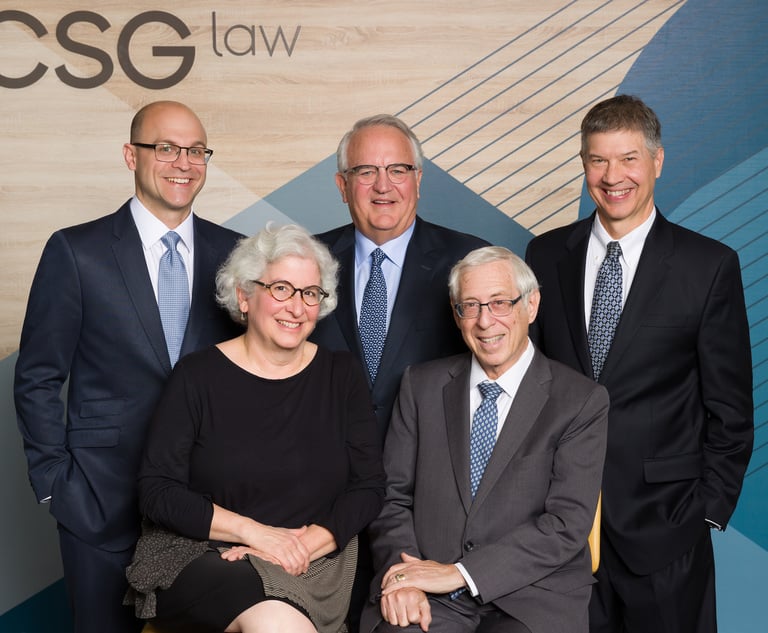 (Photo: Shutterstock.com)
(Photo: Shutterstock.com)PROFESSIONAL MALPRACTICE
Legal experts discuss the disciplinary process, the "case within a case" doctrine, using ethics rules in a malpractice proceeding, the "learned professional" exception to the CFA, and the liability of counsel for strategic decisions made at trial.
January 13, 2020 at 10:30 AM
2 minute read
See the digital edition here.
Suit-Within-a-Suit: Can a Jury Hear All Issues if There Was no Jury in the Underlying Case? Some courts suggest that when the litigant in the underlying action was never entitled to a jury trial, a jury should not decide the subsequent suit-within-a-suit in the malpractice action. Other courts, however, have held that the jury in the malpractice case should also try the suit-within-a-suit. By Brian J. Molloy and Pierre Chwang
Putting It All in Perspective: The Modern Attorney Disciplinary System Always treat the process and all those involved with courtesy and respect. When corresponding with disciplinary authorities, it does not help to use inflammatory language or to employ literary devices that belittle the process or the grievant. By Diana C. Manning
Recent Appellate Opinion Calls 'Learned Professional' Jurisprudence Into Question This case may present a suitable opportunity for the Supreme Court to provide additional guidance on the "learned professional" doctrine. As it stands, except for lawyers, doctors and theologians, there is no clear answer as to whether a professional or semi-professional remains subject to the Consumer Fraud Act. By Jeffrey T. LaRosa and Eric A. Inglis
Using Ethics Rules in Malpractice Proceedings to Protect Confidential Intellectual Property Applying RPC 1.9 (Duties to Former Clients) may make sense in a malpractice action because it can avoid disclosing confidential intellectual property information in open court. By Jonathan Bick
The Liability of Trial Counsel for Strategic and Tactical Judgments Made During Trial Decisions during trial are oftentimes based on unexpected rulings or surprise testimony and need to be made quickly. In addition, attorneys sometimes take chances in the conduct of litigation. This article looks at scenarios where malpractice claims may arise, and defenses available to counsel. By John L. Slimm and Jeremy J. Zacharias
|This content has been archived. It is available through our partners, LexisNexis® and Bloomberg Law.
To view this content, please continue to their sites.
Not a Lexis Subscriber?
Subscribe Now
Not a Bloomberg Law Subscriber?
Subscribe Now
NOT FOR REPRINT
© 2024 ALM Global, LLC, All Rights Reserved. Request academic re-use from www.copyright.com. All other uses, submit a request to [email protected]. For more information visit Asset & Logo Licensing.
You Might Like
View All
Appellate Div. Follows Fed Reasoning on Recusal for Legislator-Turned-Judge
4 minute read
Chiesa Shahinian Bolsters Corporate Practice With 5 From Newark Boutique
5 minute read
'A Mockery' of Deposition Rules: Walgreens Wins Sanctions Dispute Over Corporate Witness Allegedly Unfamiliar With Company
Trending Stories
Who Got The Work
Michael G. Bongiorno, Andrew Scott Dulberg and Elizabeth E. Driscoll from Wilmer Cutler Pickering Hale and Dorr have stepped in to represent Symbotic Inc., an A.I.-enabled technology platform that focuses on increasing supply chain efficiency, and other defendants in a pending shareholder derivative lawsuit. The case, filed Oct. 2 in Massachusetts District Court by the Brown Law Firm on behalf of Stephen Austen, accuses certain officers and directors of misleading investors in regard to Symbotic's potential for margin growth by failing to disclose that the company was not equipped to timely deploy its systems or manage expenses through project delays. The case, assigned to U.S. District Judge Nathaniel M. Gorton, is 1:24-cv-12522, Austen v. Cohen et al.
Who Got The Work
Edmund Polubinski and Marie Killmond of Davis Polk & Wardwell have entered appearances for data platform software development company MongoDB and other defendants in a pending shareholder derivative lawsuit. The action, filed Oct. 7 in New York Southern District Court by the Brown Law Firm, accuses the company's directors and/or officers of falsely expressing confidence in the company’s restructuring of its sales incentive plan and downplaying the severity of decreases in its upfront commitments. The case is 1:24-cv-07594, Roy v. Ittycheria et al.
Who Got The Work
Amy O. Bruchs and Kurt F. Ellison of Michael Best & Friedrich have entered appearances for Epic Systems Corp. in a pending employment discrimination lawsuit. The suit was filed Sept. 7 in Wisconsin Western District Court by Levine Eisberner LLC and Siri & Glimstad on behalf of a project manager who claims that he was wrongfully terminated after applying for a religious exemption to the defendant's COVID-19 vaccine mandate. The case, assigned to U.S. Magistrate Judge Anita Marie Boor, is 3:24-cv-00630, Secker, Nathan v. Epic Systems Corporation.
Who Got The Work
David X. Sullivan, Thomas J. Finn and Gregory A. Hall from McCarter & English have entered appearances for Sunrun Installation Services in a pending civil rights lawsuit. The complaint was filed Sept. 4 in Connecticut District Court by attorney Robert M. Berke on behalf of former employee George Edward Steins, who was arrested and charged with employing an unregistered home improvement salesperson. The complaint alleges that had Sunrun informed the Connecticut Department of Consumer Protection that the plaintiff's employment had ended in 2017 and that he no longer held Sunrun's home improvement contractor license, he would not have been hit with charges, which were dismissed in May 2024. The case, assigned to U.S. District Judge Jeffrey A. Meyer, is 3:24-cv-01423, Steins v. Sunrun, Inc. et al.
Who Got The Work
Greenberg Traurig shareholder Joshua L. Raskin has entered an appearance for boohoo.com UK Ltd. in a pending patent infringement lawsuit. The suit, filed Sept. 3 in Texas Eastern District Court by Rozier Hardt McDonough on behalf of Alto Dynamics, asserts five patents related to an online shopping platform. The case, assigned to U.S. District Judge Rodney Gilstrap, is 2:24-cv-00719, Alto Dynamics, LLC v. boohoo.com UK Limited.
Featured Firms
Law Offices of Gary Martin Hays & Associates, P.C.
(470) 294-1674
Law Offices of Mark E. Salomone
(857) 444-6468
Smith & Hassler
(713) 739-1250







